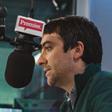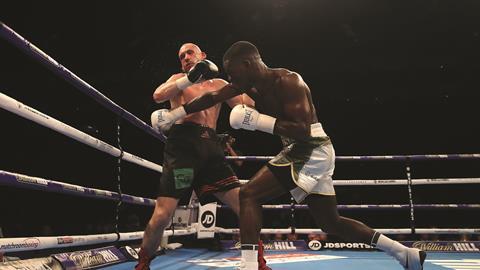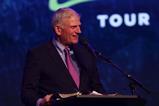Many of the world’s most successful boxers, including Alexander Usyk and Tyson Fury are also Christians. But does believing God is on your side give you an edge over your opponent?
When I first met the boxer Tyson Fury in 2011, he had just become the British heavyweight champion, after entering the ring at Wembley Arena wearing a T-shirt that read: “I found Jesus.”
In our interview he spoke of his love for Christ and how he wanted the world to know more about him and what he did to save us. He finished our interview with some words that have stayed with me. When I asked about his ambitions in the sport, he suggested God would help him become the heavyweight champion of the world – the most prestigious title in all of boxing.
“If I were a pastor in a church – even a successful church – I would only reach 1,000 people,” he said. “If I were heavyweight champion of the world I could get to more people than a million churches around the world. God knows this and God will use me to talk to people and tell them the good news.”
His cocksure attitude surprised me. Surely he was being presumptuous? Yet, in the years that followed, Fury did indeed rise through the rankings, and the brash boxer’s prediction started to look more likely.
Then, on the 11 November 2015, Fury defied the odds, silenced his doubters and beat Ukrainian Wladimir Klitschko to become the undisputed heavyweight champion of the world. His victory sent shock waves around the world. And as promised, he did go on to use his platform to share his faith – albeit controversially.
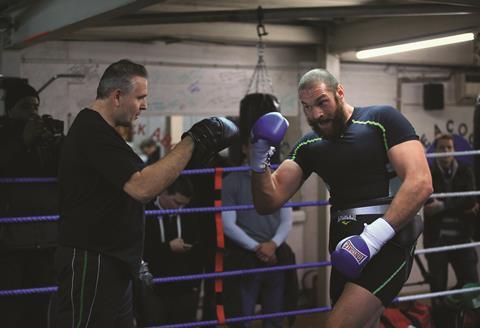
Less than a month after his victory over Klitschko, Fury said during a newspaper interview that three things needed to happen “before the devil comes home” — the legalisation of homosexuality, abortion and paedophilia. His comments caused outrage and led to demands that he be removed from the shortlist for the BBC’s Sports Personality of the Year (SPOTY) award.
When a BBC reporter asked Fury about the controversy he’d attracted, the boxer ignored the journalist’s questions and instead responded by quoting the Bible.
“What’s your reaction to people who want you off the SPOTY shortlist?” the journalist asked him. “Believe in the Lord Jesus Christ and you’ll be saved,” he replied.
“And what about you being stripped of your belt? You must be very unhappy. What’s your reaction to that?”
I PRAY THAT I BEAT THEM UP GOOD BUT THEY DON’T GET HURT
“Jesus loves me and he loves you too…and he loves everybody in the world,” Fury explained. “All you’ve got to do is repent of your sins and you’ll be forgiven.”
The journalist tried a different approach. “Do you want to win SPOTY?” he asked. It didn’t work. Fury merely recited John 3:16 and the BBC reporter never got a straight answer to any of his questions. Whether this was a wonderful example of Christians getting their message across in the mainstream media, or a sad case of believers looking deranged, is a matter of opinion.
THE GOOD FIGHT
Fury is hardly representative of the typical boxer who professes a Christian faith – he’s somewhat of an enigma, but there are a disproportionately high number of Christians competing professionally in boxing, compared to other sports. Not an event goes by without someone displaying a Bible verse on their shorts or giving the glory to God in a post-fight TV interview. There are around 50 different world champions due to the array of weight classes and different governing bodies. At least half of these have made public statements about their Christian faith.
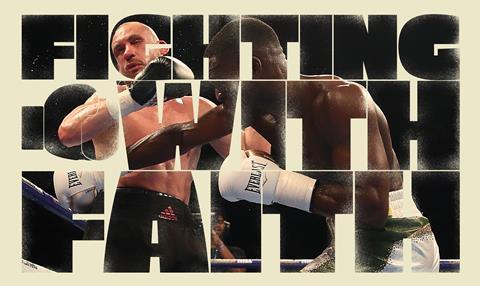
And it’s not just boxing. In the increasingly popular UFC (Ultimate Fighting Championship), talking about faith isn’t uncommon. Holly Holm, the poster girl of UFC, goes by the nickname ‘Preacher’s Daughter’ – a nod to her father’s church ministry.
Social background often has an influence on whether people are drawn to fighting sports. Working class Catholics and travelling communities (known for strong Christian beliefs) are well represented within boxing circles and seem to be less concerned with a perceived contradiction between violence and faith.
Joshua Buatsi, believed to be British boxing’s next big thing, lives by the first verse of Psalm 144: “Praise be to the Lord my Rock, who trains my hands for war, my fingers for battle.” The former English welterweight champion Erick Ochieng doesn’t see any problems mixing his faith and sport either: “It’s what I get paid to do. It’s a job. Boxing is just a different kind of office. This office you have gloves and a gum shield. I do pray for my opponent – I pray that I beat them up good but they don’t get hurt.”
3 BOXERS YOU (PROBABLY) DIDN’T KNOW ARE CHRISTIANS
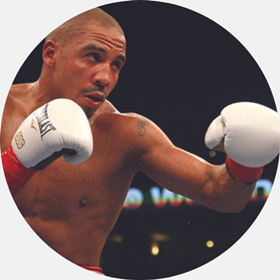
1. ANDRE WARD
As one of the very few boxers who has retired undefeated, Andre Ward will go down as one of the best ever. The former world champion took on the nickname ‘Son of God’ when he began his boxing career in 2004. Far from being an arrogant statement, inspired by Paul’s words in Galatians 3:26, Ward saw it as a public declaration of his faith. Often open about Christianity in media interviews, Ward has said his courage for boxing comes directly from his relationship with God.
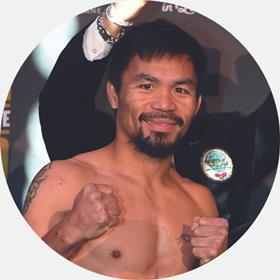
2. MANNY PACQUIAO
Although he started his boxing career living on the streets of Manilla, Philippines, Manny Pacquiao went on to become the most successful fighter of all time, winning world championships in eight different weight classes. In a career spanning three decades, he’s made more than $1.2bn. He came to faith after having had a dream where he saw two angels and heard the voice of God. He has said his life’s work is to “spread the word”.
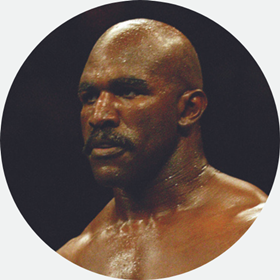
3. EVANDER HOLYFIELD
The first boxer to be crowned undisputed champion in the cruiserweight and heavyweight divisions, Holyfield became a household name thanks to fights against boxing greats Mike Tyson and Lennox Lewis. Adorning his shorts for each of his fights was the Bible verse Philippians 4:13. He has often spoken of the importance of his Christian faith throughout his life and says it was that which helped him forgive Mike Tyson for biting part of his ear off during a fight.
PSYCHOLOGICAL ADVANTAGE?
Peter Fury is one of the most admired boxing trainers in the world. He masterminded his nephew Tyson’s world title win and now trains his own son Hughie, who has also fought for the world title. I asked him whether having a faith can improve your performance. For him it’s a simple answer: “I believe that having a faith makes you a better competitor. It’s not like God is going to give you the win but it’s about putting your faith in the Lord and doing the best you can. If you have God by your side and you believe in the Lord no matter what – something happens to you. Does it help in sport? Yes. Does it help in life? Yes.”
While Fury bases his opinion on experience, there are also scientific studies that back up his theory. In the year 2000, Jong-Keun Park of Seoul University found that religious belief and prayer not only played a part in reducing anxiety but also helped athletes in reaching peak performance.
It’s an area that sports psychologist Tom Bates has also explored. “When you speak to professional athletes about their faith there is no doubt about the impact that faith has on their performance. They’ll report an extra level of safety and that, as a result, reduces anxiety,” he tells me. Bates currently works on areas of performance with Aston Villa Football Club but has worked with athletes in a variety of sports, including combat sports. He says athletes with faith “have a higher level of consciousness in a sense that they don’t always feel defined by the outcome in the competitive arena. “They know there is something else greater at play. Even though I may lose or make a mistake – ultimately, eternally, I am at one with God. That belief enables them to be the best they can be.”
Bates says he’s seen this not just on a professional level but on a personal level with athletes he’s worked with who have professed a Christian faith.
“Of course God is on the side of all of us, but the point here is when athletes believe that they’re chosen, guided, directed and supported then that belief contains the essence to transform any performance.
“Athletes with that type of belief are much more likely to persevere through setbacks.”
John Funnell is a boxing chaplain based in South Wales. He also leads Noddfa Baptist Church in Torfaen, but took his ministry to the gym after hearing a boxer say he felt the need to pray but didn’t know who he was praying to. Funnell says he often sees the benefit of prayer in the boxers he works with.
THE ONLY OTHER PERSON WHO CAN GO IN THAT RING WITH YOU IS GOD
“The only other person who can go in that ring with you is God. Now, prayer isn’t a magic spell, where you simply get the result you want. Prayer is about trust and reliance on God for his will to be done. But the coaches see that it works. You can see someone at peak physical performance, they might be fitter than they’ve ever been, but if something is not right with their soul – they’re going to lose. That’s where I come in.”
The explanation given through the Korean study is that religion and belief has a direct impact on the psychological side of sport. And in fighting sports this mental element takes on extra significance.
Explaining its importance, Bates says: “In a team sport you have others around you so there is a degree of psychological safety – if I don’t perform my teammate might be able to cover for me. In an individual sport there is no safety net. You are the sole reason for the success or the outcome, so the mindset is very different.”
And Peter Fury goes further: “To be a good boxer you need a very strong mindset and you have to believe in yourself. Without the right mentality the body doesn’t work. The mindset is everything.”
PRAYER OR PLACEBO?
While Christians would offer numerous reasons why prayer might help one’s mental state, the essence of the argument – that belief can help your performance – isn’t something atheists would necessarily object to. They’d just give a different reason for why this is the case, crediting the placebo effect for an enhanced mental state, instead of believing that God answers prayers.
Studies in the 1960s suggested religious people were less likely to suffer from heart disease, while more recent research has suggested they also live longer due to better health attributed to one’s belief in God’s protection. Bates explains how psychologists interpret this data: “The conviction of one’s belief possesses the power to manifest physical realities.
“Putting that into a religious context – when I believe that God is creating a path – that’s very different to just believing in myself alone.
“Confidence is a prerequisite for success. Thoughts become things. What we believe we become, and if I have a belief that I am unstoppable, then I manifest that into my athletic performance.
“Neurologists have found that the cortical mapping of the brain changes with prayer. They have found what they have labelled the ‘God spot’ in research into Buddhist monks when they meditate. The exact areas of the brain that are required to help us feel more focused can be activated with prayer.”
If the science shows that prayer gives you an advantage over your competitor, why don’t all athletes commit to praying before competitions? Bates says it comes down to conviction.
“What the neurologists also found is that the authenticity of that prayer – the conviction and belief associated with that prayer – directly influences the neurological pathways and cortical mapping of the brain. It could be argued scientifically that it matters not what religious belief it is, but the conviction of the belief and the depth of that belief directly defines the athlete’s capability to consistently access those areas of the brain which will help them perform under pressure. Neurologically – prayer has a benefit but, unless it’s held with a deep conviction, it may only allow itself to be a fleeting whim.”
THE FULL PACKAGE
God’s plan coming into being and the psychological benefits of faith may well be claimed as reasons for success, but obviously the other important aspect is talent. And for Peter Fury, talent coupled with faith produces the perfect recipe for success.
“When you have God in your life it’s a great benefit. If your faith is strong enough, you can achieve anything,” he says.
That was clearly a mantra that was drilled into Tyson Fury on his journey to the top. His self-belief (or perhaps better expressed as his belief in what he saw as God’s plan) was so strong that it propelled him to victory. He’s clearly very talented and has mastered boxing’s art of ‘hit and don’t get hit’. But would his talent alone have got him to the very top? How much did his positive mental attitude add to his success? Or is it simply a case of God putting him where he needed to be?
Funnell says there’s biblical precedent for the latter: “God blesses those who trust in him and God uses broken vessels to share his living water. I’m instantly brought to Joseph and how God made him a leader in Egypt. God elevated him so his name could be glorified, so I have no doubt he can do that with boxers.”
Some may argue that Joseph used his platform a little smarter than Fury. Since becoming champion of the world there’s no getting away from the fact he has (rightly or wrongly) offended many. Critics have branded him homophobic and misogynistic, and few Christians would defend his use of coarse language. He’s also endured a well-publicised fall from grace through a battle with drugs and alcohol.
Fury returns to the spotlight this month in his hotly anticipated rematch with American big hitter Deontay Wilder (another boxer who professes a Christian faith). If you catch any of the build-up to that fight, your expectations of how Christians should behave will probably be tested. Expect bad language, threatening behaviour and more controversial statements.
But come fight night, both men will enter the ring believing God is on their side. Will their beliefs cancel each other out? Will God decide the victor or will it simply be a matter of ‘may the best man win’? If their past match ups are anything to go by we could be in for a spectacular occasion but perhaps the post-fight statements of faith in victory or defeat will be the real defining moment.
THE BOXING EVANGELIST
Every year I take on a new physical challenge and last year I was encouraged to get involved in a charity boxing bout. The harsh reality of what I had signed up for became apparent in my third training session. As I sparred, I was left dazed after being hit in the face and for the first time felt the emotion of hitting someone else. I quickly became used to getting some pretty hard blows to the head.
There’s a real fear factor when it comes to getting into a ring and it was something that I prayed about while training. When it came to fight night, I was paired with someone much younger and heavier than me. I entered the arena, full of 1,500 lairy supporters chanting. As the fight began, I soon realised I was much fitter than my opponent and in the first round I caught him with a clean punch. Blood began to pour from his nose and in that moment I did think “what would Jesus do”. I chose to ease off as I didn’t want to inflict further pain.
I won the fight but was left drained by the whole experience. It definitely had a psychological effect on me too as I would later find myself sizing people up in the street. I had felt God say it was OK to take on the challenge but it’s not something I feel I could continue with.
ANDY FROST is the director of mission charity Share Jesus International
